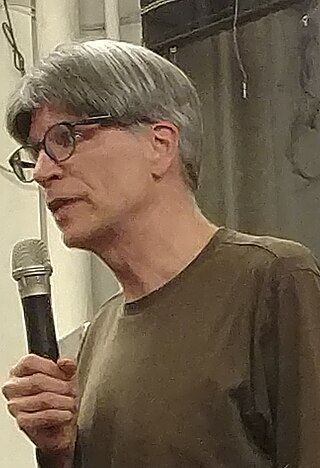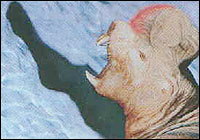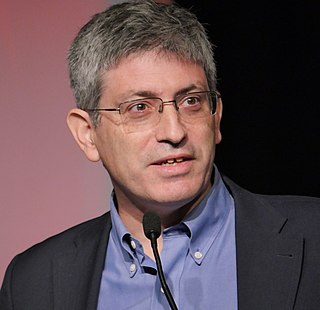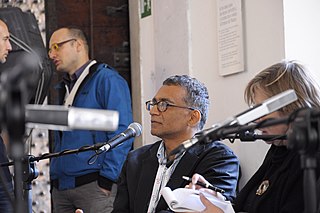
Sandra Moore Faber is an American astrophysicist known for her research on the evolution of galaxies. She is the University Professor of Astronomy and Astrophysics at the University of California, Santa Cruz, and works at the Lick Observatory. She has made discoveries linking the brightness of galaxies to the speed of stars within them and was the co-discoverer of the Faber–Jackson relation. Faber was also instrumental in designing the Keck telescopes in Hawaii.

Richard Powers is an American novelist whose works explore the effects of modern science and technology. His novel The Echo Maker won the 2006 National Book Award for Fiction. He has also won many other awards over the course of his career, including a MacArthur Fellowship. As of 2023, Powers has published thirteen novels and has taught at the University of Illinois and Stanford University. He won the 2019 Pulitzer Prize for Fiction for The Overstory.

The Hotheaded Naked Ice Borer is a fictional animal invented by Discover magazine as an April Fool's Day joke.

Ronald Bailey is an American libertarian science writer. He has written or edited several books on economics, ecology, and biotechnology.
Natalie Angier /ænˈdʒɪər/ is an American nonfiction writer and a science journalist for The New York Times. Her awards include the Pulitzer Prize for Beat Reporting in 1991 and the AAAS Westinghouse Science Journalism Award in 1992. She is also noted for her public identification as an atheist and received the Freedom from Religion Foundation’s Emperor Has No Clothes Award in 2003.

Carl Zimmer is a popular science writer, blogger, columnist, and journalist who specializes in the topics of evolution, parasites, and heredity. The author of many books, he contributes science essays to publications such as The New York Times, Discover, and National Geographic. He is a fellow at Yale University's Morse College and adjunct professor of molecular biophysics and biochemistry at Yale University. Zimmer also gives frequent lectures and has appeared on many radio shows, including National Public Radio's Radiolab, Fresh Air, and This American Life.

Mary Roach is an American author specializing in popular science and humor. She has published seven New York Times bestsellers: Stiff: The Curious Lives of Human Cadavers (2003), Spook: Science Tackles the Afterlife (2005), Bonk: The Curious Coupling of Science and Sex (2008), Packing for Mars: The Curious Science of Life in the Void (2010), Gulp: Adventures on the Alimentary Canal (2013), Grunt: The Curious Science of Humans at War (2016), and Fuzz: When Nature Breaks the Law (2021).
Gareth Cook is an American journalist and editor. He was awarded a Pulitzer Prize in 2005 for “explaining, with clarity and humanity, the complex scientific and ethical dimensions of stem cell research.” Cook is a contributing writer for The New York Times Magazine, is also the series editor of The Best American Infographics and editor of Mind Matters, Scientific American's neuroscience blog. His writing has appeared in The New York Times Magazine, The Boston Globe, Wired, and Scientific American.
John Colapinto is a Canadian journalist, author and novelist and a staff writer at The New Yorker. In 2000, he wrote the New York Times bestseller As Nature Made Him: The Boy Who Was Raised as a Girl, which exposed the details of the David Reimer case, a boy who had undergone a sex change in infancy—a medical experiment long heralded as a success, but which was, in fact, a failure.
Francis Daniels Moore was an American surgeon who was a pioneer in numerous experimental surgical treatments. Among his many achievements, he refined burn-treatment techniques, helped perform the world's first successful organ transplant, and accurately determined the volume of water and other nutrients in the human body using radioactive isotopes of those substances.
Eric J. Chaisson is an American astrophysicist known for his research, teaching, and writing on the interdisciplinary science of cosmic evolution. He is a member of the Center for Astrophysics | Harvard & Smithsonian, teaches natural science at Harvard University and is an elected Fellow of the American Association for the Advancement of Science.

The American Institute of Physics (AIP) instituted their Science Writing Award to "promote effective science communication in print and broadcast media in order to improve the general public's appreciation of physics, astronomy, and allied science fields." The winner receives $3000, and an engraved Windsor chair. The award is given in three broad categories: 1) science writing, 2) work intended for children, and 3) work done in new media. The AIP stopped issuing awards to three categories: 1) work by a professional journalist 2) work by a scientist, and 3) broadcast media

The Best American Science and Nature Writing is a yearly anthology of popular science magazine articles published in the United States. It was started in 2000 and is part of The Best American Series published by Houghton Mifflin. Articles are chosen using the same procedure with other titles in the Best American series; the series editor chooses about 100 article candidates, from which the guest editor picks 25 or so for publication; the remaining runner-up articles listed in the appendix. The series is available through Mariner Books, which since 2019 is an imprint of HarperCollins.
George Musser is a contributing editor for Scientific American magazine in New York and the author of The Complete Idiot’s Guide to String Theory and of Spooky Action at a Distance.

Gordon Grice is an American science writer and horror writer.
Adam Frank is an American physicist, astronomer, and writer. His scientific research has focused on computational astrophysics with an emphasis on star formation and late stages of stellar evolution. His work includes studies of exoplanet atmospheres and astrobiology. The latter include studies of the generic response of planets to the evolution of energy-intensive civilizations (exo-civilizations).

Jennifer Ouellette is a science writer based in Los Angeles, California.

Anil Ananthaswamy is an Indian author, and science journalist, who is currently a Knight Science Journalism Research fellow at the Massachusetts Institute of Technology. He has been a deputy news editor and staff writer for the London-based New Scientist science magazine.
Natalie Ann Wolchover is a science journalist. She is a senior writer and editor for Quanta Magazine, and has been involved with Quanta's development since its inception in 2013. In 2022 she won a Pulitzer Prize for Explanatory Reporting.
Michael P. Branch is an ecocritic, writer, and humorist with over three hundred publications, including work in The Best American Essays, The Best American Science and Nature Writing and The Best American Nonrequired Reading. An important member of the environmental and writing community, Western American Literature has described him as part of the "enduring procession of outdoor journalists."









